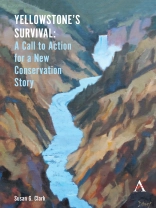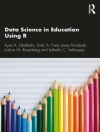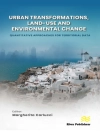This book focuses on Yellowstone: the park, the larger ecosystem, and even more so, the “idea” of Yellowstone. In presenting a case for a new conservation paradigm for the Greater Yellowstone Ecosystem (GYE), including Yellowstone National Park, the book, at its heart, is about people and nature relationships. This new paradigm will be truly committed to a healthy, sustainable environment, rich in other life forms, and one that affords dignity for all: humans and nonhumans. The new story or paradigm must be about living such a commitment and future for GYE in real time.
To do something and understand about the present erosion of nature and growing unsustainability, particularly the GYE situation, the book offers a heuristic for problem solving, learning, and discovery. The heuristic in four general terms, People, Meaning, Society, Environment, takes into account both the content (biophysical substance such as wolves and bears) and process (people, social relations, and decision-making) of conservation and sustainability in our communities, society, and in our daily living. It calls for an explicit integrative approach to this relationship for GYE. It acknowledges that Yellowstone will be different in the future from what we have experienced in recent decades. It also asks how and why it will be different and whether we’re ready for it. To examine these and related questions, and deeper questions, it probes the future. As well, it reflects on the changing narratives, policies, and actions of different sets of residents and outside influences. The book presents a well-developed theory for interdisciplinary problem solving that is grounded in practice.
表中的内容
List of Illustrations; Foreword by Dan Wenk; Preface; Acknowledgments; 1. Stories of People, Nature, Yellowstone; Part 1 Yellowstone as a Story; 2. Yellowstone and Significance; 3. Greater Yellowstone as a System; 4. Boundaries and Context; Part 2 People’s Stories; 5. Controversy and Society; 6. People and Stories of Meaning; 7. Coherence and Policy; Part 3 Working for Ecosystem Conservation; 8. Challenges and Future; 9. Learning and Transforming; 10. The Work Ahead; 11. Creating a New Story, the Long View; Notes; Index.
关于作者
Susan G. Clark is the Joseph F. Cullman 3rd Professor (adjunct) of Wildlife Ecology and Policy Sciences and fellow in the Institution for Social and Policy Studies, Yale University. She has diverse experience in the NGO community, academia, and in field work internationally. She focuses on professional interdisciplinary education and skill training for leadership, professionalism, and problem solving.












